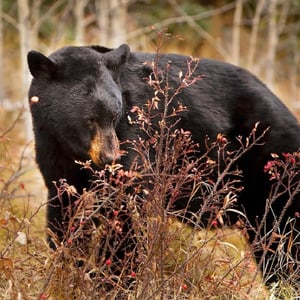
For humans, Labor Day is a bittersweet indication that summer is coming to a close. We use that final long weekend to savor the sunshine with one last trip to the lake or the pool. Perhaps we’re buying last-minute school supplies or taking advantage of the retail sales to stock up on sweaters for the fall. Another favorite way to celebrate is the end-all be-all summer barbeque. Take out the grill before you unhook the propane for the season, don your tropical shirt and flip flops one more time, and gorge on burgers and hotdogs like it’s your last meal. For some animals, Labor Day doesn’t look too different. You won’t see a black bear in a tropical shirt, but you may see one dining like it’s their last meal. That’s because it just might be—at least until next spring.
Winter brings harsh conditions for wildlife, especially in the Rocky Mountains. Heavy snowfall and freezing temperatures greatly reduce the amount of food available for herbivores, omnivores, and carnivores alike. However, Colorado’s full-time species have several adaptations that help them survive. Some, like marmots and ground squirrels, weather the season by hibernating, during which they enter a state of reduced physiologic activity. Their metabolism slows and their body temperature lowers, enabling them to decrease the amount of energy they need. Others, such as bears, enter a state called torpor, which is a more involuntary, short-term state of decreased activity that occurs during intense periods of cold. Animals in torpor can awaken and resume activity.
Whether its hibernation or torpor, these animals use the end of summer and the duration of autumn to prevent winter starvation. Thus, Labor Day in the animal world means the start of hyperphagia. Hyperphagia is a seasonal phase of intense, gluttonous hunger that typically begins in September and lasts until winter. It is an instinctual last-ditch effort to eat as much as possible in order to survive the cold season. Black bears, for example, need to start eating 20,000 calories (or about 67 cheeseburgers) each day. The bears nearly double their body weight during hyperphagia if these foods are abundant. Luckily, the duration of hyperphagia falls within the growing period of berries and fat-rich nuts, helping animals put on pounds.

Hyperphagia brings a significant increase in daytime activity for those getting ready for winter, particularly for bears. They have to spend most of their days scrounging for food and water while there are still resources. As a result, there’s a greater chance of seeing one on your fall hikes or camping trips! They are hungry, but do not feed them! The best practice is to always keep your distance from any animal you see. If you are doing an overnight trip, keep your food in your car or in a proper bearproof system (bear hang or bear canister). Be sure to respect their space, as you are the one entering their habitat. If you happen to have a close encounter with a bear, stand tall and make a lot of noise. Yell, sing happy birthday, or even firmly tell the bear to go away. Importantly, stay calm and do not run. Back away slowly if the bear does not leave the area first.
Interfering with hyperphagia may threaten an animal’s ability to survive the winter. As humans, following Leave No Trace ethics and exhibiting proper behavior during animal encounters will help them prepare for the long, cold season ahead. As a result, we can all enjoy fall’s beautiful transition to winter.
Claire Kantor is a naturalist at Walking Mountains Science Center. She will be camping this Labor Day, and properly storing her food to keep hungry bears away!
References:
https://www.nps.gov/articles/bears-winter.htm
https://www.sciencedirect.com/science/article/pii/B9780080454054005036
https://www.donteatforwinter.com/what-causes-overeating-is-hyperphagia-a-human-instinct/








